The BioLabs have been undergoing a period of expansion of capabilities, seen in the new equipment available, and in the types of project they are thus able to support, such as the recent work conducted in the Containment Level 2 (CL2) suite and the variety of student positions that are intended to be undertaken in 2023.
Contents:
New Equipment:
Class 2 Cabinet
There is a new Class 2 Cabinet in the CL2 Suite of the R80 Biolab. A Class 2 cabinet ensures that in addition to airflow away from the user, the sample itself is in a stable laminar flow, both protecting the user from the sample and the sample from external contamination. This Class 2 Microbiological Safety Cabinet (MSC) will allow mammalian cell cultures and bacterial cultures to be handled safely. The cabinet will is suitable for Hazard Group 1 and 2 microorganisms and live cells.
It should not be confused with the Laminar Flow Cabinet next to it, as this does not offer protection.
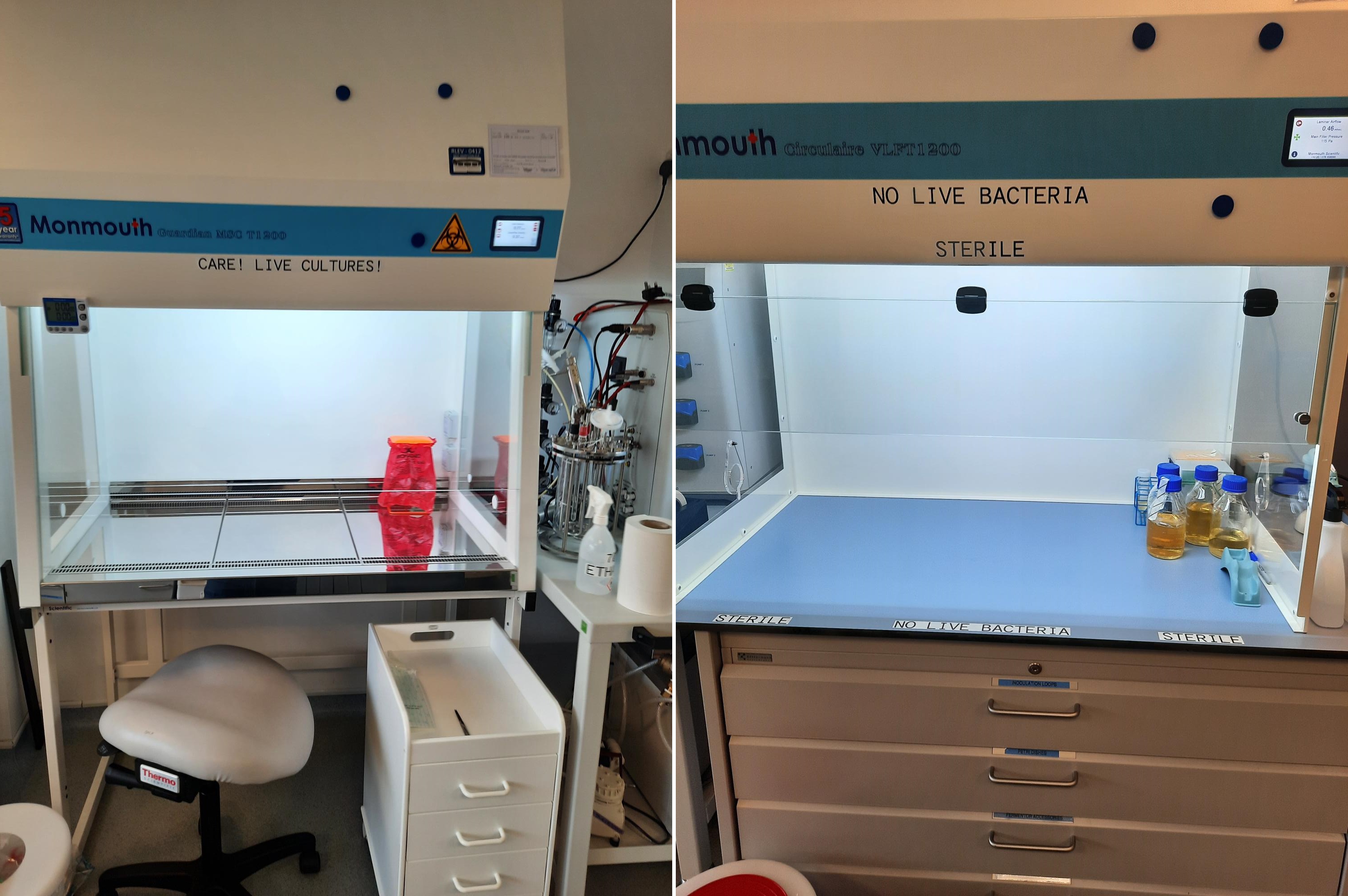
Class 2 Cabinet (left) and Laminar Flow Cabinet (right). Note the signage indicating which can and cannot be used for live cultures.
Laminar Flow Cabinet
In addition to the MSC, there is also a new Laminar Flow Cabinet. The direction of the airflow in this cabinet is out from the bottom, which means that this does not offer any protection from the samples handled inside, and is to protect the samples from the environment in the HEPA-filtered, sterile laminar flow air coming from the top of the cabinet. It is for handling sterile samples only, no live bacteria. Due to the laminar flow, the sample will not be buffeted by strong airflow in the cabinet.
NanoDrop
There is a new NanoDrop instrument in the R80 BioLab. This instrument allows measurements of the absorbance of a sample in the UV-Vis region. Samples can either be loaded in a quartz cuvette, or as a drop as small as 2 microlitres. The instrument is used to determine the concentration of proteins, RNA or DNA in samples.
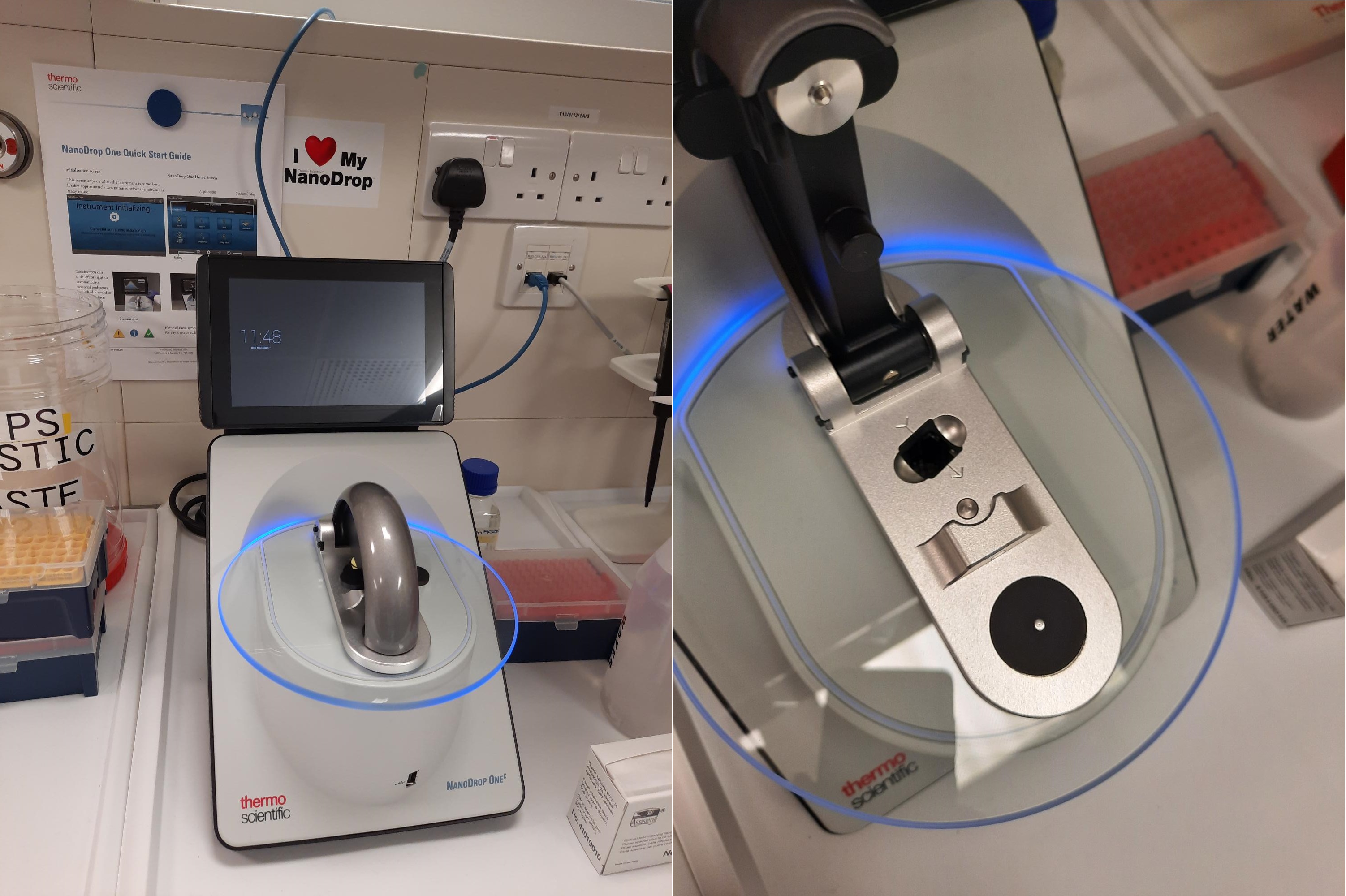
NanoDrop equipment (left), close up on 2 μL holder (pinprick in the metal circle inside the black circle)(right).
Sonicator and Sound Enclosure
The BioLab manager has procured a new sonicator and sound enclosure. The sonicator is used for cell disruption for subsequent protein purification and cellular membranes. The new enclosure can be operated by pedal, seen on the floor here. There are multiple different probe sizes available for the sonicator, suitable for different sample sizes.
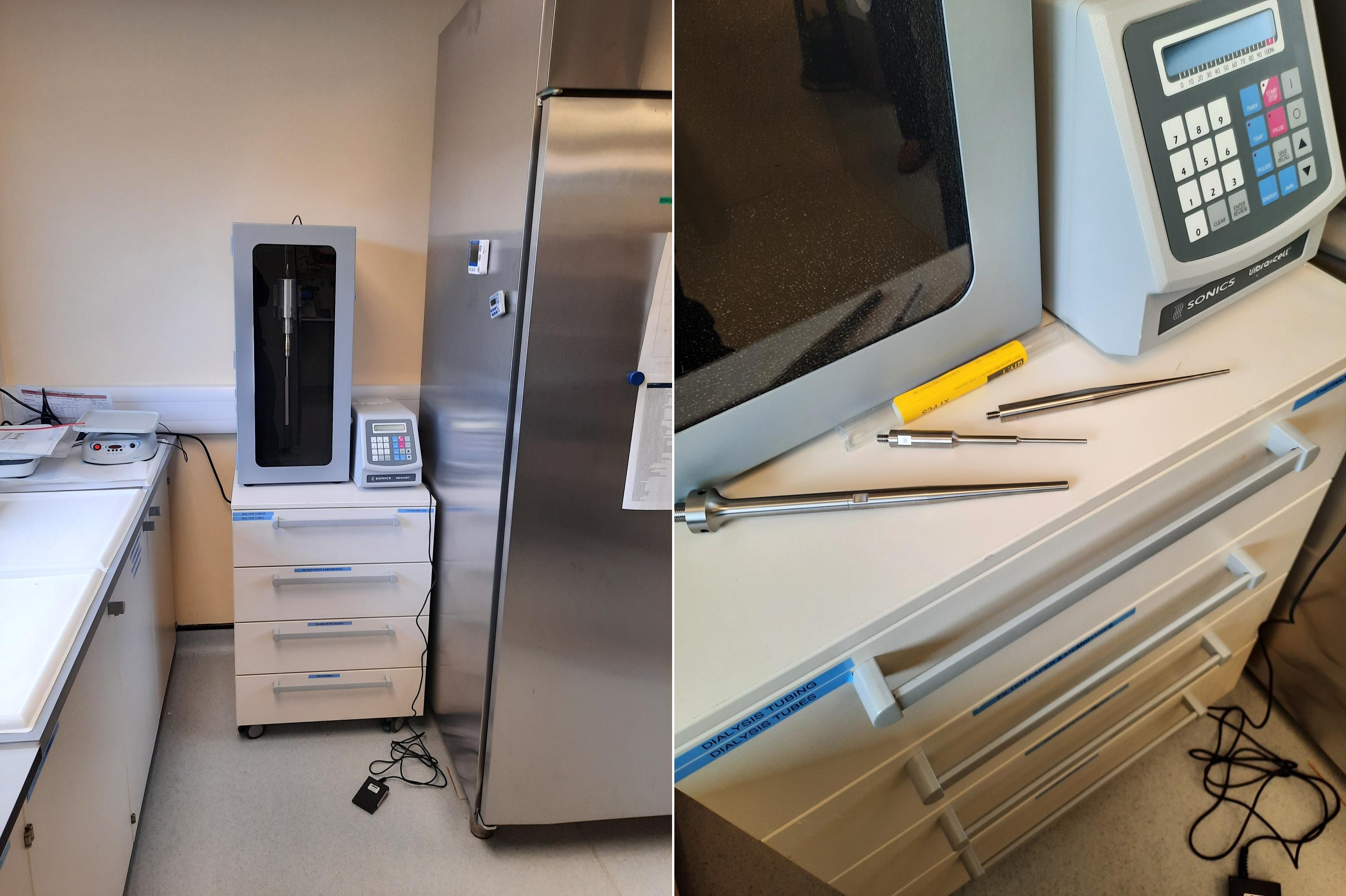
Sonicator in the new enclosure (left), close up on the additional probes (right).
Studentships
2 placement student positions within the Biolab have been agreed for the coming year. One is joint with Najet, the other is joint with Peixun. They are currently shortlisting for interviews.
Insect Cell Protein Expression Research Industrial Placement
This project will be carried out jointly between the ISIS SANS group and the ISIS Biology Laboratories. Since bacteria are unable to properly fold and modify some recombinant proteins due to the lack of complex cellular machinery, it is advantageous to produce these proteins in insects which do possess sufficiently complex mechanisms. This project will be to develop experimental procedures for the expression and production of functionally active recombinant proteins in insect cells and determining their solution structure.
Bio Deuteration Support Scientist Industrial Placement
This project will be carried out jointly between the
ISIS Deuteration Facility and the ISIS Biology Laboratories. Deuteration in living cells can yield a large quantity of deuterated biomaterial, making it very suitable for neutron experiments. The project is to establish a working protocol for producing these deuterated bacterial components at ISIS. This includes lipids, native bacterial proteins, and recombinant proteins, each in large quantities.
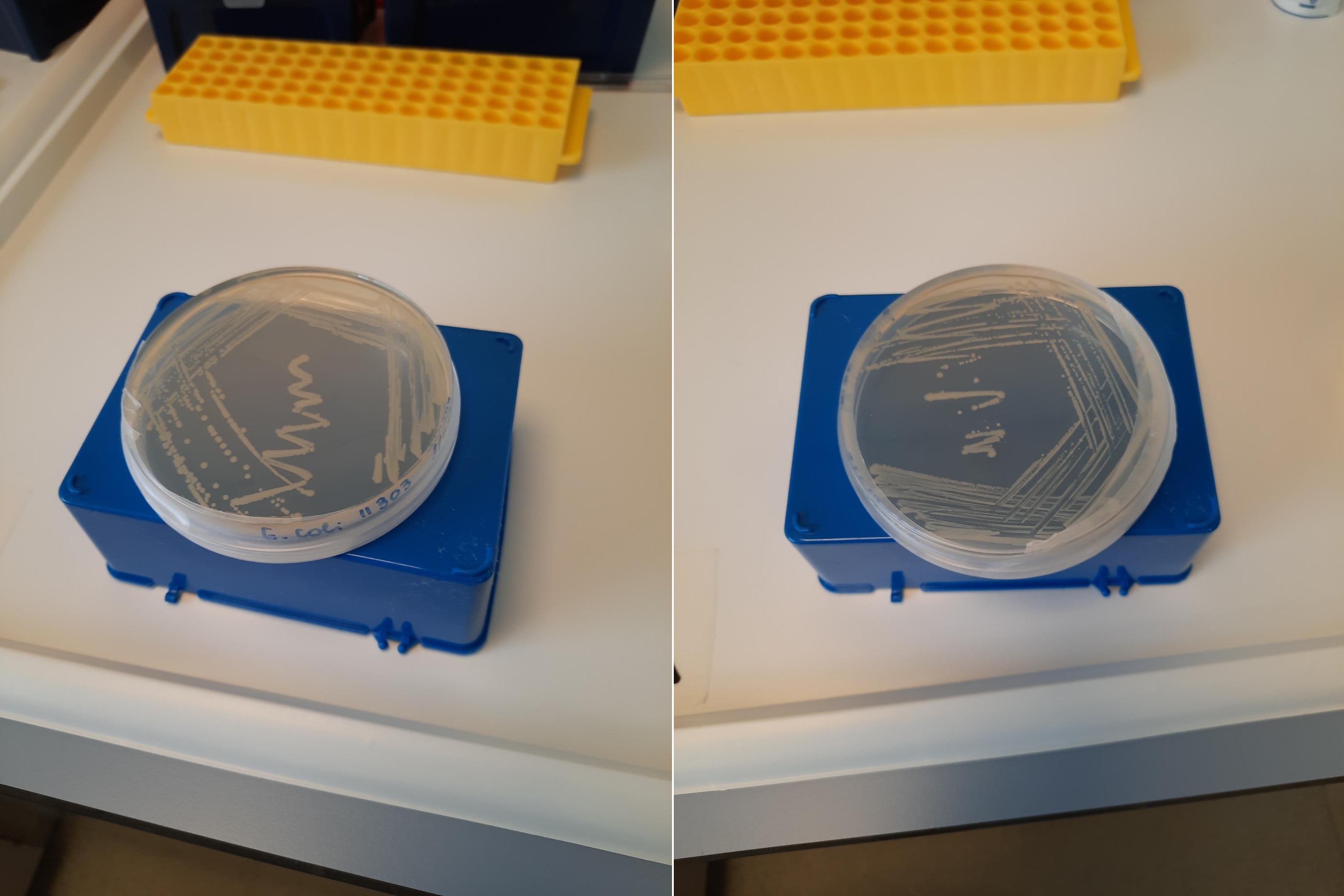
E. Coli 11303 samples being grown in advance of student starting.
Preliminary work on this has already begun, with some E.Coli 11303 bacteria being grown in advance.
General Upates:
Cold Room
It has been decided that the operation of the Cold Room will be temporarily modified due to needs. The 4
°C room will remain as it is. The -15
°C room will temporarily become a second 4
°C room, and the -35
°C room will temporarily become a -15
°C room. This will minimise the risks inherent to the -35
°C room while it is not needed, and also save energy. A new Risk Assessment is being written to reflect these changes. If you need the -35
°C room, please
contact the BioLab manager.
CL2 Suite
There have been a wide range of samples within a wide range of topics pass through the BioLabs since the last update. Notably, the CL2 suite was in use over the summer, both for the processing of live cancer cells for beamtime experiments and for the growing of cyanobacteria and algae for their own beamtime experiments.
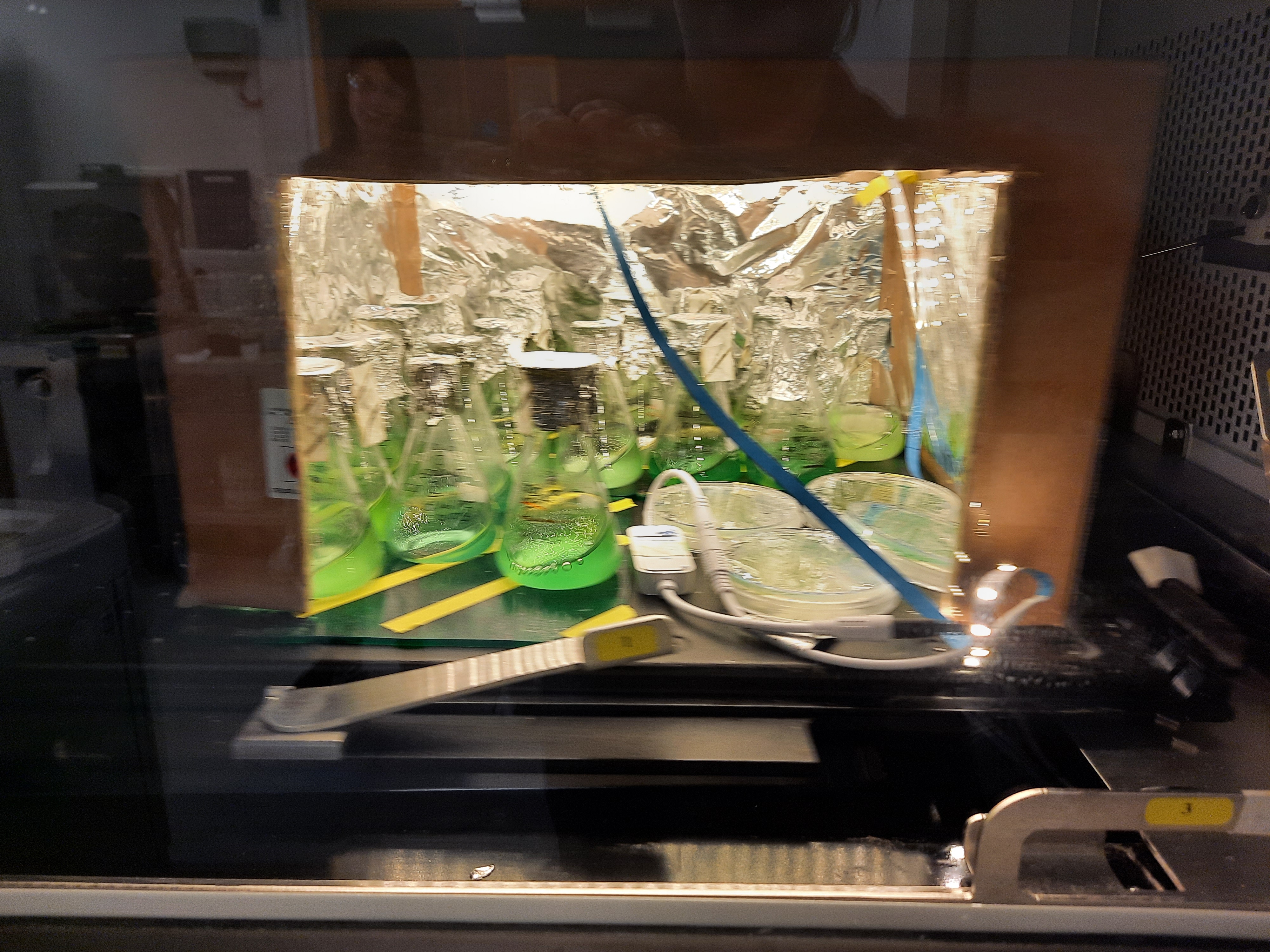
Cyanobacteria, growing while being shaken and illuminated.
Chiller Cabinet
The chiller cabinet in the R80 BioLab has been set to 6 °C to be suitable for chilled sample processing, for example being used for dialysis in a D2O buffer solution; while most fridges at ISIS run at 4 °C, below the freezing point of D2O, this one will allow samples to remain in liquid D2O. This is not intended to be used for storage, so users are asked to remove their samples when the processing is completed.
6 °C Chiller Cabinet, ready for use.
For any further details about the BioLabs or anything included on this page, please contact the BioLab manager, Dr Ludmila Mee, and check out the Biology Laboratories
website.
